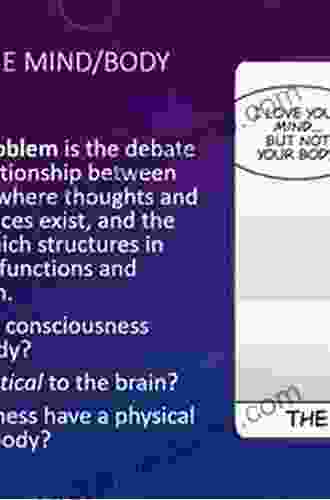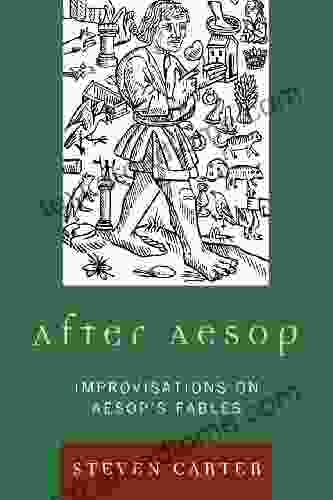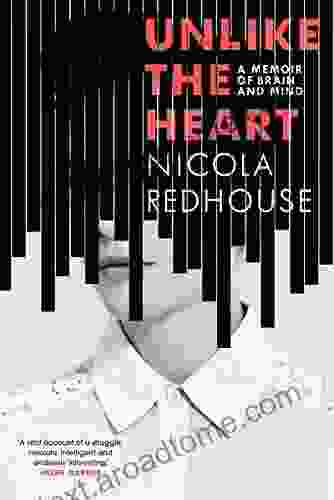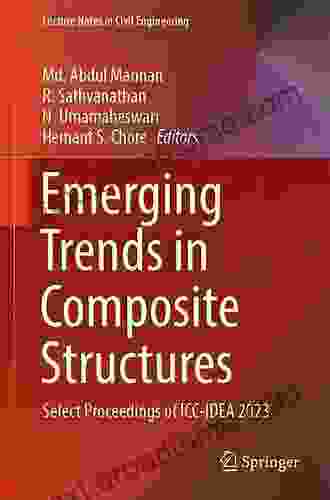Unveiling the Enigmatic Mind-Body Problem

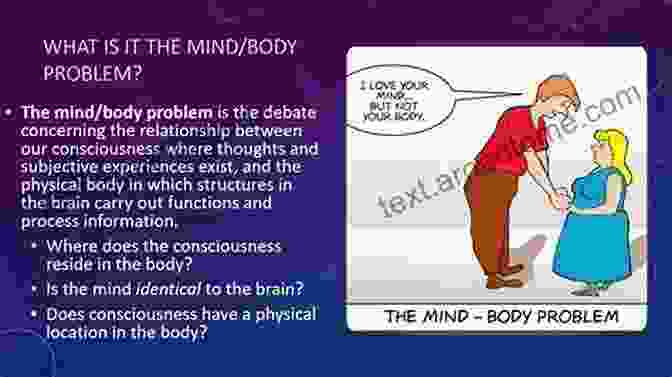
5 out of 5
| Language | : | English |
| File size | : | 17355 KB |
| Screen Reader | : | Supported |
| Print length | : | 250 pages |
| X-Ray for textbooks | : | Enabled |
: The Enduring Philosophical Enigma
The mind-body problem, a philosophical conundrum that has captivated thinkers throughout history, remains one of the most fascinating and enigmatic questions in contemporary philosophy. Its origins date back to the ancient Greek philosophers who grappled with the nature of reality and the relationship between the physical body and the immaterial mind. The problem encompasses a fundamental question: How is it possible for conscious experience to arise from physical matter?
The Philosophical Divide: Dualism vs. Physicalism
Historically, two main opposing philosophical schools of thought have emerged to address the mind-body problem:
- Dualism proposes that the mind and body are separate entities, existing independently of each other. This perspective maintains that the mind has an immaterial nature and is not subject to the laws of physics. Dualists argue that consciousness and subjective experiences are inherent properties of the mind.
- Physicalism, on the other hand, asserts that the mind is ultimately reducible to physical processes occurring in the brain. Physicalists believe that consciousness is a product of the complex interactions within the brain and that the mind is an emergent property of the physical system.
Exploring the Gaps: Challenges for Reductionism
While physicalism has gained significant traction in recent years, particularly with the advancements in neuroscience, it faces persistent challenges in explaining the subjective nature of consciousness and the enigmatic phenomenon of qualia. Qualia refer to the qualitative aspects of our conscious experiences, such as the distinctive taste of coffee or the vibrant hue of the sky. These subjective experiences remain a puzzle for physicalism to fully account for.
The Hard Problem of Consciousness
Philosopher David Chalmers famously introduced the concept of the "hard problem of consciousness." He argued that physical processes, no matter how complex, cannot explain the subjective nature of consciousness. Chalmers suggests that consciousness is not a computational process or an algorithmic operation but rather a fundamental property of the universe that is irreducible to physical terms.
Neuroimaging and the Search for Neural Correlates
Advancements in neuroimaging techniques have allowed scientists to investigate the neural underpinnings of consciousness. Studies have identified specific brain regions associated with various aspects of conscious experience, such as the visual cortex for processing visual stimuli. However, correlating neural events with subjective experiences remains a complex and nuanced endeavor.
Implications for Consciousness and Free Will
The mind-body problem has profound implications for our understanding of consciousness and free will. If the mind is an immaterial entity, then it may operate outside the deterministic realm of physical laws, potentially allowing for true free will. However, if the mind is entirely reducible to physical processes, then free will may be constrained by the laws of nature.
: An Ongoing Philosophical Quest
The mind-body problem continues to challenge the boundaries of our understanding of the human experience. It is a reminder of the enigmatic nature of consciousness and the limits of our attempts to reduce it to purely physical terms. As we delve deeper into this philosophical conundrum, we embark on an ongoing quest for answers that may ultimately shed light on the fundamental nature of our being.
Free Download 'The Mind-Body Problem' today and embark on a journey to explore the depths of this enduring philosophical enigma.
Buy Now
5 out of 5
| Language | : | English |
| File size | : | 17355 KB |
| Screen Reader | : | Supported |
| Print length | : | 250 pages |
| X-Ray for textbooks | : | Enabled |
Do you want to contribute by writing guest posts on this blog?
Please contact us and send us a resume of previous articles that you have written.
 Book
Book Novel
Novel Page
Page Chapter
Chapter Text
Text Story
Story Genre
Genre Reader
Reader Library
Library Paperback
Paperback E-book
E-book Magazine
Magazine Newspaper
Newspaper Paragraph
Paragraph Sentence
Sentence Bookmark
Bookmark Shelf
Shelf Glossary
Glossary Bibliography
Bibliography Foreword
Foreword Preface
Preface Synopsis
Synopsis Annotation
Annotation Footnote
Footnote Manuscript
Manuscript Scroll
Scroll Codex
Codex Tome
Tome Bestseller
Bestseller Classics
Classics Library card
Library card Narrative
Narrative Biography
Biography Autobiography
Autobiography Memoir
Memoir Reference
Reference Encyclopedia
Encyclopedia Robert P Lanza
Robert P Lanza Megan Hart
Megan Hart Margot Anand
Margot Anand Marie Sophie De Maissin
Marie Sophie De Maissin Natalie Goldberg
Natalie Goldberg Thomas Patteson
Thomas Patteson Taylor Owen
Taylor Owen Rolf Reber
Rolf Reber Mario Casciaro
Mario Casciaro Michael A Samuel
Michael A Samuel Melissa Joulwan
Melissa Joulwan Morey Bernstein
Morey Bernstein Yvonne Morrison
Yvonne Morrison Marco Henseling
Marco Henseling Sam Rohdie
Sam Rohdie Tina Hartigan
Tina Hartigan Travis Russell
Travis Russell Nola Marie
Nola Marie Peter Parkinson
Peter Parkinson Mary Lou Heiss
Mary Lou Heiss
Light bulbAdvertise smarter! Our strategic ad space ensures maximum exposure. Reserve your spot today!

 George Bernard ShawEffortless Weight Loss Fasting with Fast Metabolism: A Beginner's Guide to...
George Bernard ShawEffortless Weight Loss Fasting with Fast Metabolism: A Beginner's Guide to... Colt SimmonsFollow ·15.8k
Colt SimmonsFollow ·15.8k Gabriel Garcia MarquezFollow ·2.4k
Gabriel Garcia MarquezFollow ·2.4k Felipe BlairFollow ·18.4k
Felipe BlairFollow ·18.4k Darnell MitchellFollow ·17.3k
Darnell MitchellFollow ·17.3k Derek BellFollow ·4.5k
Derek BellFollow ·4.5k Heath PowellFollow ·14k
Heath PowellFollow ·14k Gus HayesFollow ·9k
Gus HayesFollow ·9k Raymond ParkerFollow ·6.4k
Raymond ParkerFollow ·6.4k
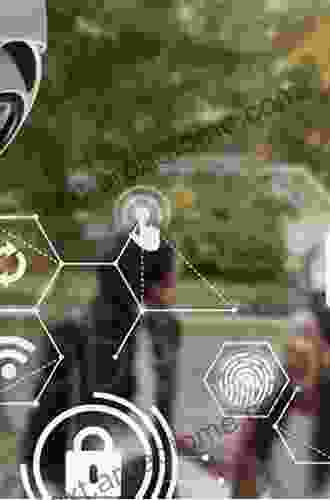
 Ralph Ellison
Ralph EllisonIntelligent Video Surveillance Systems: The Ultimate...
In a world...
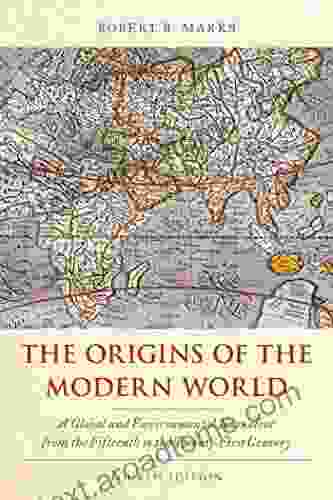
 Jeffrey Cox
Jeffrey CoxThe Origins of the Modern World: A Journey to the Roots...
Embark on an Extraordinary...
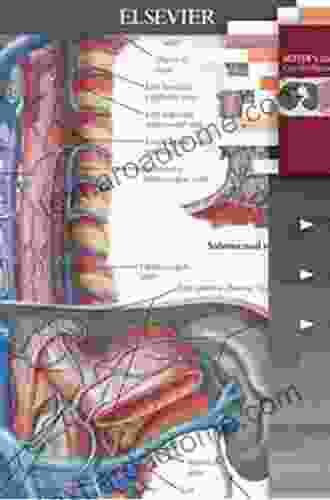
 Paulo Coelho
Paulo CoelhoUnlock the Power of Integrated Medical Imaging with...
In the rapidly evolving...

 Charles Reed
Charles ReedThe Christ of the Covenants: Unlocking the Mystery of...
Embark on a Profound...
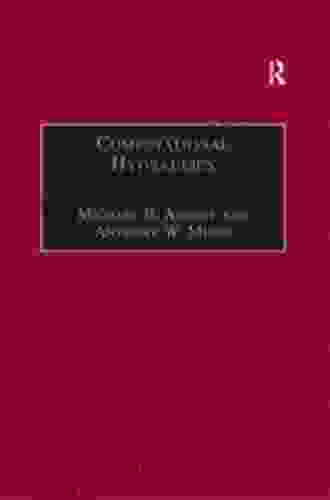
 Elton Hayes
Elton HayesComputational Hydraulics: A Comprehensive Guide for...
In the realm of fluid dynamics,...
5 out of 5
| Language | : | English |
| File size | : | 17355 KB |
| Screen Reader | : | Supported |
| Print length | : | 250 pages |
| X-Ray for textbooks | : | Enabled |


